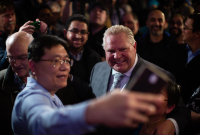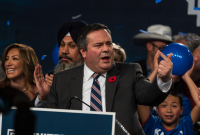Allegations of political interference that could damage the independence of the Ontario Provincial Police have exploded in a series of stunning headlines.
The allegations were raised in a nine-page letter that was signed by Brad Blair, the interim commissioner of the police force.
The Ontario Provincial Police is the third largest deployed police service in North America, Blair writes in his letter.
The OPP is also the police force that would be tasked with handling any investigations that involve Premier Doug Ford and his government.
Blair's letter focuses on how the government selected the new commissioner, Superintendent Ron Taverner, slated to take command of the police force on Dec. 17, 2018.
Blair was also in the running for the same job, but he lost out to Taverner, a close family friend of Premier Doug Ford, and critics have alleged his appointment was not made independently. The premier himself has admitted he didn't recuse himself when the decision was made by his cabinet.
Taverner, 72, is a divisional superintendent with Toronto Police — a force he has been with for over 50 years, which has involved working on organized crime and intelligence cases.
Ford (along with his late brother and former Toronto mayor, Rob) have strong political ties in the Etobicoke area of Toronto, where Taverner commanded regional police divisions.
Blair sent his letter to the province's ombudsman, Paul Dubé, urging the watchdog to investigate these allegations, while warning that ignoring growing concerns could cause "irreparable damage to police independence."
The letter also asks that Taverner not assume command as scheduled on Dec. 17, but wait until after a review has been completed by Dubé, with an interim commissioner appointed or Blair to stay in the role until Feb. 3.
Here are ten of the most compelling arguments and insinuations contained in the letter:
- That Blair was viewed as a "front runner candidate" for the job, based on his qualifications and experience.
- That key requirements for the job were modified two days after it was posted, removing the need for a candidate to hold a certain level of rank in a major police service. Taverner would not have met the initial requirements. This revelation was originally reported by iPolitics.
- That Sal Badali, a partner at headhunting firm Odgers Berdtson, told Blair "on numerous occasions that he had no influence on either the process or the outcome of the interviews." Badali's fellow panel members were a deputy minister and the deputy attorney general.
- That the hiring panel members "changed at the last minute." Doug Ford's chief of staff Dean French was due to take part in Blair's second round interview but Blair saw him leave the building. Ten minutes before Blair's interview was due to start, he was told that French would not attend.
- That Badali had told Blair that a hiring decision would be made following one of two scheduled cabinet meetings, but that it was in fact made before either meeting took place. In addition, Taverner was seen leaving the premier's office on the day the decision was made.
- That French (Ford's chief of staff) had requested the OPP purchase a large vehicle to be modified to Ford's specifications, and asked for a sole source provider's costs to be kept off the books during the command of his predecessor, Commissioner Vince Hawkes, who retired in November.
- That Blair met with Taverner at a Swiss Chalet after Taverner had been named to the job and that Taverner told him that he had run into a reporter after his second-round interview, and that the reporter accused him of leaving Ford's office. He said Taverner told him he asked the reporter to "hold off on any story in exchange for providing this reporter with a first interview in the near future," suggesting that Taverner knew he would be named to the job.
- That Premier Ford had made requests for specific officers to serve on his security detail so that he "would feel comfortable" — disrupting the chain of command within the OPP and a dedicated unit responsible for the security of the premier and the lieutenant-governor.
- That Premier Ford told the previous commissioner, J.V.N. "Vince" Hawkes that if the top cop would not address Ford's security requests, that perhaps a new commissioner would.
- That the "perception of political interference in the hiring process has deeply affected the morale of the rank and file" at the OPP, Blair wrote. "OPP officers have shared with me their concerns that the process was unfair and their feeling that the independence of the OPP is now called into question." They believe that this will affect public confidence in the police, which runs counter to principles of a democratic society as well as running counter to fully effective policing, Blair added.
Blair, who had also applied for the job, said he has accepted he will not remain commissioner and that his request has "nothing to do" with wanting to stay in the job.

"I have been a proud member of the OPP for over 32 years. I have policed in every corner of this province and it has been an honour and a privilege to serve with the dedicated men and women of the OPP," Blair wrote. "As commissioner, I have a moral and legal obligation to ensure that the OPP remains independent."
"I must put my service to the OPP ahead of personal ambition in order to repair the apprehension of bias over this process and the potential damage to the reputation of the OPP."
The Ford government said it would not comment on Blair's motivations for the request for a review but would "explore the appropriate venue to review the content of a letter that we fully and completely dispute."
Community Safety and Correctional Services Minister Sylvia Jones said in a statement that the government stands by the process that led to Taverner's appointment.
"It is unfortunate that this service has been unfairly maligned by unfounded allegations about the appointment process," Jones said. "We would respect any decision made by the ombudsman about an inquiry into this matter and would cooperate with any such review."
The OPP hiring scandal is just the latest in a string of complaints of political interference leveled at Doug Ford's government, which came to power in June.
Ford's government invoked extraordinary powers to change municipal election rules and cut Toronto city hall almost in half in the middle of an election campaign, while a Washington state regulator citing political interference in denying Hydro One a takeover. Then there is the allegation that French, Ford's chief of staff, intervened to have Alykhan Velshi, an ex-staffer for former PC Party leader Patrick Brown, removed from a middle management job at Ontario Power Generation.
French also wanted officials to order police to raid outlaw cannabis stores on the day the drug became legal, sources told the Star newspaper.
— with files from Fatima Syed






Comments
`That Premier Ford had made requests for specific officers to serve on his security detail so that he "would feel comfortable" — disrupting the chain of command within the OPP and a dedicated unit responsible for the security of the premier and the lieutenant-governor.'
The Ford Gang mentality. He just can't shake it.
Sigh...I was raised in the greater NYC area. The legacy of the Tammany Hall political machine was still in evidence during my childhood. In NJ, my father worked in Jersey City which had the reputation of being run by a corrupt combination of political and criminal operatives, as was Paterson a near neighbor of Jersey City. Local papers wrote frequent articles covering the on-going corruption scandals - during and for several years after WWII.
Ontario's current government and Premier raise all too familiar red flags! Ford is a fossilized throwback to a neither forgotten nor lamented bygone era. Corrupting the police force is always an early step in corrupting the entire government apparatus.
Doug Ford is a criminal thug. The Ontario legislature needs to choose a new Premier.